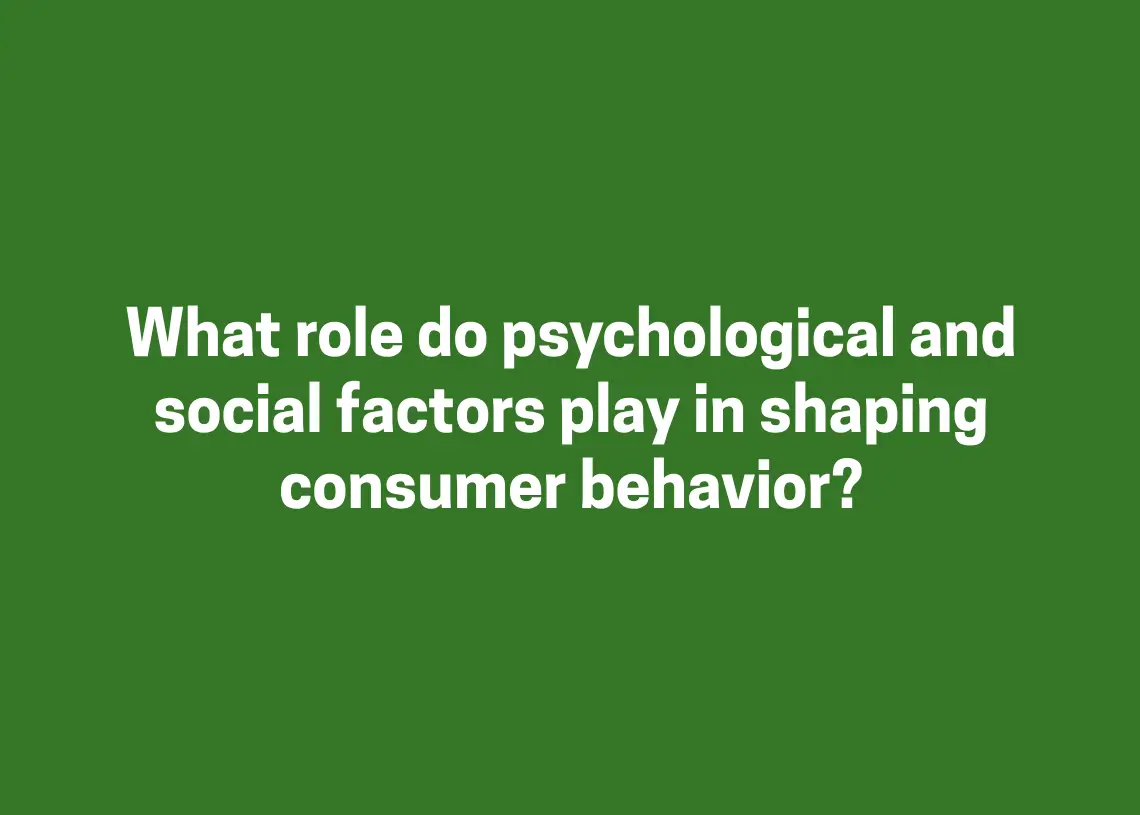Consumer behavior is a complex and multi-dimensional field of study, that has gained immense importance in the business world. As our economy is driven by consumer spending, it is crucial to understand the factors that influence consumer behavior.
While previous research has focused on the rational and logical aspects of consumer decision-making, recent studies have emphasized the role of psychological and social factors in shaping consumer behavior. In today’s blog post, we will explore the impact of psychological and social factors on consumer behavior, and how businesses can utilize this knowledge to create more effective marketing strategies.
Psychological factors such as perception, motivation, attitudes, and beliefs, are internal factors that play a significant role in shaping consumer behavior. Social factors, on the other hand, are external factors such as culture, family, social class, and reference groups, that also have a significant impact on consumer behavior. These factors are interconnected, and understanding their interplay can provide valuable insights into consumer behavior.
Earn a certificate in your dream career for an affordable price at IAP Career College today!
Perception & cognitive biases affect decisions
One of the key psychological factors that influence consumer behavior is perception and cognitive biases. Consumers tend to make decisions based on their perceptions of a product or service, rather than objective reality. These perceptions are often shaped by cognitive biases, which can lead to irrational decision-making.
For example, the availability bias may lead consumers to overestimate the likelihood of a particular outcome based on the frequency with which it is reported in the media. Similarly, the anchoring effect may cause consumers to rely too heavily on the first piece of information they receive when making a decision.
Understanding these cognitive biases and how they influence consumer behavior is critical for marketers looking to craft effective messaging and advertising campaigns. By tailoring their messaging to address these biases, marketers can increase the effectiveness of their campaigns and improve the likelihood of converting potential customers into loyal advocates for their brand.
Emotions impact buying choices
Emotions are a crucial factor that influences the decision-making process of consumers. Consumers often make purchasing decisions based on their emotions, rather than their logical reasoning. Emotions can range from excitement, happiness, and satisfaction, to fear, anger, and sadness.
For instance, a consumer may purchase a product that makes them feel happy or fulfilled, or avoid purchasing a product that makes them feel frustrated or angry. Marketers recognize the importance of emotions in the decision-making process and create marketing campaigns that appeal to consumers’ emotions.
By evoking emotions such as happiness or excitement, marketers can create positive associations with their products, leading to increased sales. On the other hand, negative emotions such as fear or anxiety can be used to create a sense of urgency or scarcity, resulting in impulse purchases. Understanding the role of emotions in consumer behavior is essential for creating effective marketing strategies that appeal to consumers’ emotions.
Social norms shape preferences
One key psychological and social factor that plays a significant role in shaping consumer behavior is social norms. Social norms refer to the unwritten rules and expectations that guide behavior in a particular society or group.
These norms can shape consumer preferences by influencing what individuals perceive as desirable or acceptable. For example, in some cultures, it may be considered fashionable to wear designer clothing, while in others, modest clothing may be preferred. Similarly, social norms can also influence attitudes towards certain products or brands.
For instance, if a particular brand is associated with a particular social group or lifestyle, individuals who identify with that group may be more likely to choose that brand. As such, understanding how social norms shape consumer preferences can be a useful tool for marketers looking to connect with their target audience.
Attitudes toward brands influence decisions
One of the most important psychological factors that shape consumer behavior is the attitudes individuals hold towards brands. Attitudes can be defined as a person’s overall evaluation of a product or service based on their feelings, beliefs, and behavioral intentions related to it.
These evaluations can be positive, negative, or neutral and can significantly impact a consumer’s decision-making process. Positive attitudes towards a brand can lead to increased likelihood of purchasing, customer loyalty, and positive word of mouth.
Negative attitudes, on the other hand, can lead to decreased likelihood of purchasing, lack of loyalty, and negative reviews. As a result, companies invest significant resources into understanding and shaping consumer attitudes towards their brands through advertising, marketing, and other initiatives.
Personality traits impact purchasing behavior
One of the critical psychological factors that influence consumer behavior is personality traits. Research suggests that personality traits can impact how individuals perceive, choose, and use products and services. For instance, individuals with high levels of openness to experience are more likely to try new and unconventional products, while those with a need for achievement may be drawn towards products that enhance their status or help them achieve their goals.
Additionally, personality traits can also influence how consumers respond to marketing and advertising messages. For example, individuals with high levels of extraversion may be more responsive to social media marketing and promotions, whereas individuals with high levels of neuroticism may be more influenced by fear-based advertising. Hence, businesses must consider personality traits when developing marketing strategies to ensure that they appeal to their target audience.
Social influence affects consumer choices
One important factor that plays a significant role in shaping consumer behavior is social influence. Social influence can be defined as the impact that other people have on an individual’s attitudes, beliefs, values, and behaviors.
Consumers are often influenced by the opinions and actions of their family, friends, acquaintances, and even strangers they encounter on a daily basis. Social influence can take many forms, such as peer pressure, social norms, and conformity. For example, if a person sees that their friends are using a particular product or service, they may be more likely to use it themselves.
Social influence can also be seen in the power of celebrity endorsements, in which consumers are more likely to purchase a product if it is promoted by a well-known public figure. Understanding the role of social influence in consumer behavior is essential for marketers and businesses to develop effective marketing strategies that appeal to their target audience.
Cultural background shapes preferences
Cultural background is one of the most significant factors that shape consumer behavior. Individuals from diverse cultural backgrounds have different preferences and habits that drive their purchasing behaviors. As consumers, we are often influenced by our culture, traditions, beliefs, and values.
Our cultural background shapes our outlook on life, including our perspectives on what we need and what we desire. For instance, a person from an Asian culture may prioritize the importance of family and community, while a person from a Western culture may focus on individualism and self-expression.
These differences can significantly affect consumers’ purchasing decisions, as they may look for products and services that align with their cultural values. As a result, businesses must understand the cultural preferences of their target audience to effectively market their products and services.
Motivations drive consumer behavior
Consumer behavior is a complex phenomenon that is influenced by a wide range of psychological and social factors. Among these factors, motivations play a crucial role in shaping consumer behavior. Motivations are the underlying reasons why people engage in certain behaviors or activities, and they are driven by a variety of internal and external factors.
In the context of consumer behavior, motivations can be seen as the driving force behind why consumers make certain purchasing decisions. Understanding the different types of motivations that drive consumer behavior can help marketers and businesses better understand their target audience and create more effective marketing strategies.
Learning and experience affect choices
One important psychological factor that can influence consumer behavior is the individual’s learning and experience. People tend to make choices based on their past experiences and the knowledge they have accumulated over time.
This includes the information they have acquired about products and services, as well as the feedback they have received from others. For example, if a consumer has had a positive experience with a particular brand, they are more likely to choose that brand in the future. On the other hand, if they have had a negative experience, they may avoid that brand altogether.
Additionally, consumers may also be influenced by their personal beliefs and attitudes, which can be shaped by their cultural background, values, and social norms. Therefore, it is important for businesses to understand how learning and experience affect consumer behavior, and to use this knowledge to develop effective marketing strategies.
Self-concept impacts purchasing decisions
The concept of self has a significant influence on consumer behavior. According to research, a person’s self-concept, which includes their beliefs, attitudes, and values, plays a vital role in shaping their purchasing decisions.
People tend to buy products that match their self-concept and help them express their identity to others. For instance, if someone sees themselves as environmentally conscious, they are more likely to purchase products that align with their values and beliefs, such as eco-friendly products.
On the other hand, if someone values status and social recognition, they may be more inclined to purchase luxury goods to demonstrate their high social standing. Therefore, understanding a person’s self-concept is crucial for businesses to tailor their marketing strategies and develop products that resonate with their target consumers.
Conclusion: What role do psychological and social factors play in shaping consumer behavior?
In conclusion, psychological and social factors are significant determinants of consumer behavior. Marketers need to be aware of these factors to create effective marketing strategies that can influence consumers’ decisions and behaviors.
By understanding the psychological factors that motivate people, such as perception, learning, motivation, and attitudes, marketers can tailor their messages to appeal to their target audience. Additionally, social factors like family, culture, reference groups, and social class can also influence consumer behavior.
Therefore, it is essential to take into account these social and psychological factors while designing marketing campaigns to meet the needs and wants of consumers. By doing so, businesses can gain a competitive edge and build long-term relationships with their customers.




